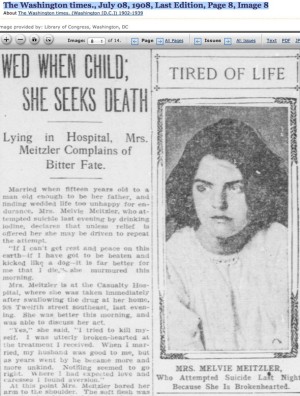
Elephind.com is a website with a search engine that searches a number of newspaper collections. According to the website, 1,099,175 Newspapers are searched from 1,034 Newspaper Titles.
Quite a number of newspapers are made available in searchable digital format with a software called Veridan. Veridian makes it easy to search, view and interact with digitized newspaper collections on the internet. It was designed specifically to organize large digitized newspaper collections and make them easily accessible to anyone online. Most of the source collections that are searchable from Elephind.com are Veridian-based collections. Elephind.com uses the same search functionality built for Veridian software, so search results are fast, accurate, and relevant. Elephind.com is hosted entirely “in the cloud”, as are many Veridian-based collections.
The collections are as follows:
Australia
- Trove (National Library of Australia)
New Zealand
- Papers Past (National Library of New Zealand)
- Upper Hutt City Library
Singapore
- Singapore National Library Board
United States
- Boston College
- California Digital Newspaper Collection (UC Riverside)
- Cambridge Public Library, Massachussets
- Chronicling America (US Library of Congress)
- Door County Library
- Kent State University
- University of Richmond
- University of California, San Francisco
- University of Illinois
- University of Missouri School of Journalism (Missouri Digital Heritage)
CLICK HERE to see a list of titles by collection (Click on the collection of interest).
I did a search across all the collections and got 313 results for a search on the surname “Meitzler.” All 131 hits came from newspapers within the United States – specifically 122 results from the Chronicling America (US Library of Congress) collection and 9 results from the University of Illinois collection. Neither of these collections have much of anything on my Metizler family, as the papers represented are not from the areas of the country where my Meitzlers lived. However, I certainly found some fascinating stuff, including an article from the Washington Times (July 08, 1908, Last Edition, Page 8, Image 8), about one Melvie Meitzler, who tried to kill herself, claiming abuse by her husband. Click on the illustration to see the article.
Search for your family with elephind.com.

Overall, I am quite impressed with this new search engine given that it includes a number of Virginia newspapers that I have reason to search on a regular basis and which I’ve had difficulty finding on-line, necessitating that I not only search microfilm, but even travel to a library outside of Richmond because no interlibrary loan copy is available, and I stopped going to Library of Congress after it instituted the policy of requiring that I place my computer bag in a locker in the main building rather than in the same building where I needed to work, necessitating that I use the convoluted tunnels connecting the building to avoid going through “security”, so the fact LC is participating in this project is quite welcome, for even though LC does not charge for interlibrary loans, I have waited for 6 months and more to receive a loan request with no explanation, e.g., the loan copy was in use, why.
That said, users (and particularly novices) need to be aware of several things.
First, as I was unable to find a specific list of newspapers included, I was obliged to do a search on a surname, then make an educated guess as to whether a specific hit was what I wanted. Many of the citations did not include the locality of the newspaper, though it is possible to restrict a search to a specific state, thus one needs to be familiar with the newspapers which have been published in a locality of interest. If one is doing more of a “see what I can find” search, you may well have to look at every citation found!
Second, one of the citations I found was from the Newport News Daily Press, but the “source” for the same was identified as RICHMOND!
Finally, there is no highlighting of the citation on the actual paper. Short of there being a photograph as with the article cited by Leland on Mrs. Melvie Meitzler from the Washington Times, or a headline large enough to “catch” one’s attention, you will be faced with the prospect of both having to read the entire paper of the newspaper and zooming in to the point that one might only be able to scroll a single column as one reads!
These considerations are unlikely to affect seasoned professionals such as myself, but beginnings and people with limited patience or time to spend in such pursuits are apt to find this resource difficult to use.
P.S.
I realized only after posting this that I should have said that the list of newspapers is alphabetical by title with no ability to break the list down by locality, so that when the locality is not included in that title, determining the locality can be difficult if one is not already familiar with the names of newspapers, both past and current, in that locality
There are times when relatives appear in newspapers outside the area where they lived. A distant cousin died in Ohio due to a train-bus crash; the story, with his name, age, and town of residence listed, appeared in the New York Times – several hundred miles away.
Clay,
Not only is what you say true, but there are also instances where a death, marriage or birth notice appears in a newspaper in an area where the individual had either previously lived or has relatives living. One client found an obituary for his ancestor who lived in Norfolk, VA, in a newspaper in New Orleans in 1848. There does not appear to be any extant issues of a Norfolk paper for the same time period, or at least none which includes the obit!
However, you remarks, and my follow-up, do not disprove my original point, namely that the lack of a specific information is some instances as to where the newspaper was published will often make it necessary to look at every citation found rather than only the ones that clearly “fit”.
Michael,
It appears that you do not totally understand the function and service that elephind performs. It is a search engine only. After the results are displayed in the results page from a search in elephind, any selection takes you directly to the Source site which is not owned by or managed by elephind. For example, if a result is housed in the LOC site, clicking on a result from there takes you directly to that site, where the citation of the newspaper title, edition, date, page etc is prominently displayed. For Leland’s example, where some of the results were from the U of I site, it takes another step or two to find the source – in that case you just click on “View Issue” and then enter “1” in the box between Prev Issue and Next Issue to take you to the newspaper’s front page where you can read and write down the pertinent information.
Hope this helps. Elephind is a very useful search resource but the sites where the results are housed are not in their purview or under their control, so the citing that you seek is handled by the individual repositories software, not Elephind.